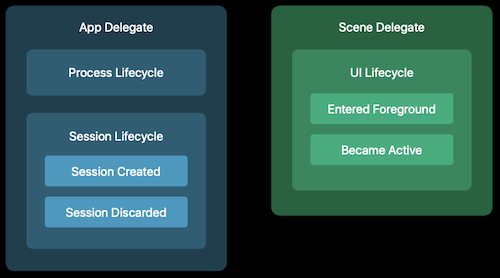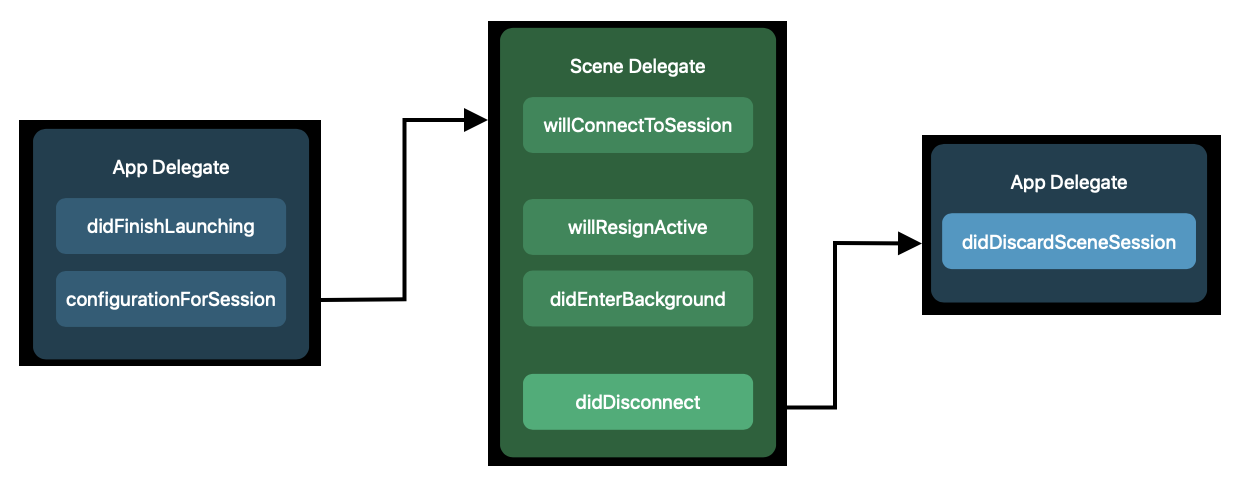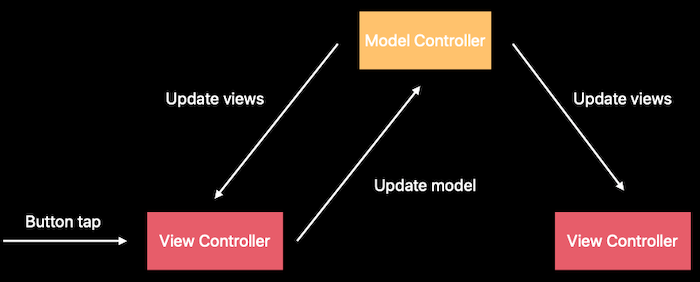# 258-Architecting Your App for Multiple Windows
# Changes to app lifecycle
iOS 13 支持多 window,为了支持多 window, 引入 Scene Delegate,将 UI Lifecycle 从 App Delegate 移动到 Scene Delegate。现在 Scene Delegate 负责 UI Lifecycle,App Delegate 负责 Process Lifecycle (App Launched, App Terminated, ...) 和 Session Lifecycle。
iOS 13 以前,App 有一个进程和一个用户界面,而 iOS 13 App 多个用户界面(scenes)共享一个进程。

# Lifecycle

# Configuring new session
创建 scene configurations 有两种方式,一个是在 info.plist 进行配置,一个是编码
# info.plist
现在用 Xcode 11 新建一个工程,默认就是这个方式

UISceneConfigurations
The default configuration details for UIKit to use when creating new scenes. Two keys:
UIWindowSceneSessionRoleApplication
Scenes that you use to display content on the device's main screen and respond to user interactions.
UIWindowSceneSessionRoleExternalDisplay
Scenes that you use to display content on an externally connected display.
# Programming
class AppDelegate: UIResponder, UIApplicationDelegate {
/// Returns the configuration data for UIKit to use when creating a new scene.
func application(_ application: UIApplication, configurationForConnecting connectingSceneSession: UISceneSession, options: UIScene.ConnectionOptions) -> UISceneConfiguration {
// Called when a new scene session is being created.
// Use this method to select a configuration to create the new scene with.
let config = UISceneConfiguration()
config.sceneClass = UIWindowScene.self
config.delegateClass = SceneDelegate.self
config.storyboard = UIStoryboard(name: "Main", bundle: nil)
return config
}
}
2
3
4
5
6
7
8
9
10
11
12
# Without storyboard
class SceneDelegate: UIResponder, UIWindowSceneDelegate {
var window: UIWindow?
func scene(_ scene: UIScene, willConnectTo session: UISceneSession, options connectionOptions: UIScene.ConnectionOptions) {
// Use this method to optionally configure and attach the UIWindow `window` to the provided UIWindowScene `scene`.
// If using a storyboard, the `window` property will automatically be initialized and attached to the scene.
// This delegate does not imply the connecting scene or session are new (see `application:configurationForConnectingSceneSession` instead).
guard let windowScene = (scene as? UIWindowScene) else { return }
window = UIWindow(windowScene: windowScene)
let viewController = ...
window?.rootViewController = viewController
window?.backgroundColor = UIColor.white
window?.makeKeyAndVisible()
}
}
2
3
4
5
6
7
8
9
10
11
12
13
14
15
# State restoration
class SceneDelegate: UIResponder, UIWindowSceneDelegate {
// 保存
func stateRestorationActivity(for scene: UIScene) -> NSUserActivity? {
let currentActivity = fetchCurrentUserActivity(for: self.window)
return currentActivity
}
// 恢复
func scene(_ scene: UIScene, willConnectTo session: UISceneSession, options: UIScene.ConnectionOptions)
if let restorationActivity = session.stateRestorationActivity {
self.configure(window: window, with: restorationActivity)
}
}
2
3
4
5
6
7
8
9
10
11
12
# Keeping scenes in sync
为了同步 scenes, 现在不能只更新一个 view controller, 需要更新 model, 然后由 model 更新 所有相关的 view controller,可以使用 delegates, notifications, 新增的 Combine Framework等

# Demo
class ChatViewController: UIViewController {
@objc func didEnterMessage(sender: UITextField) {
let message = Message(text: sender.text)
// Update the model
ChatModelController.shared.add(message: message)
}
override func viewDidLoad() {
// 接收通知,更新 UI
NotificationCenter.default.addObserver(selector: ..., name: .NewMessageNotification)
}
}
class ChatModelController {
static let shared = ChatModelController()
func add(message: Message) {
saveToDisk(message)
let event = UpdateEvent.NewMessage(message: message)
event.post()
}
}
enum UpdateEvent {
case NewMessage(message: Message)
static let NewMessageNotification = Notification.Name(rawValue: "NewMessage")
func post() {
// Notify subscribers
switch self {
case .NewMessage(message: _):
NotificationCenter.default.post(name: UpdateEvent.NewMessageNotification, object: self)
}
}
}
2
3
4
5
6
7
8
9
10
11
12
13
14
15
16
17
18
19
20
21
22
23
24
25
26
27
28
29
30
31
32
33
# Classes and Protocols
UISceneConfiguration
Information about the scene, scene delegate and storyboard for UIKit to use when creating a particular scene.
UISceneSession
An object containing information about one of your app's scenes.
UIScene -> UIWindowScene
An object that represents one instance of your app's user interface.
UISceneDelegate -> UIWindowSceneDelegate
The core methods you use to respond to life-cycle events occurring within a scene.
UIScene.ConnectionOptions
A data object containing information about the reasons why UIKit created the scene.
UISceneActivationConditions
The set of conditions that define when UIKit activates the current scene.